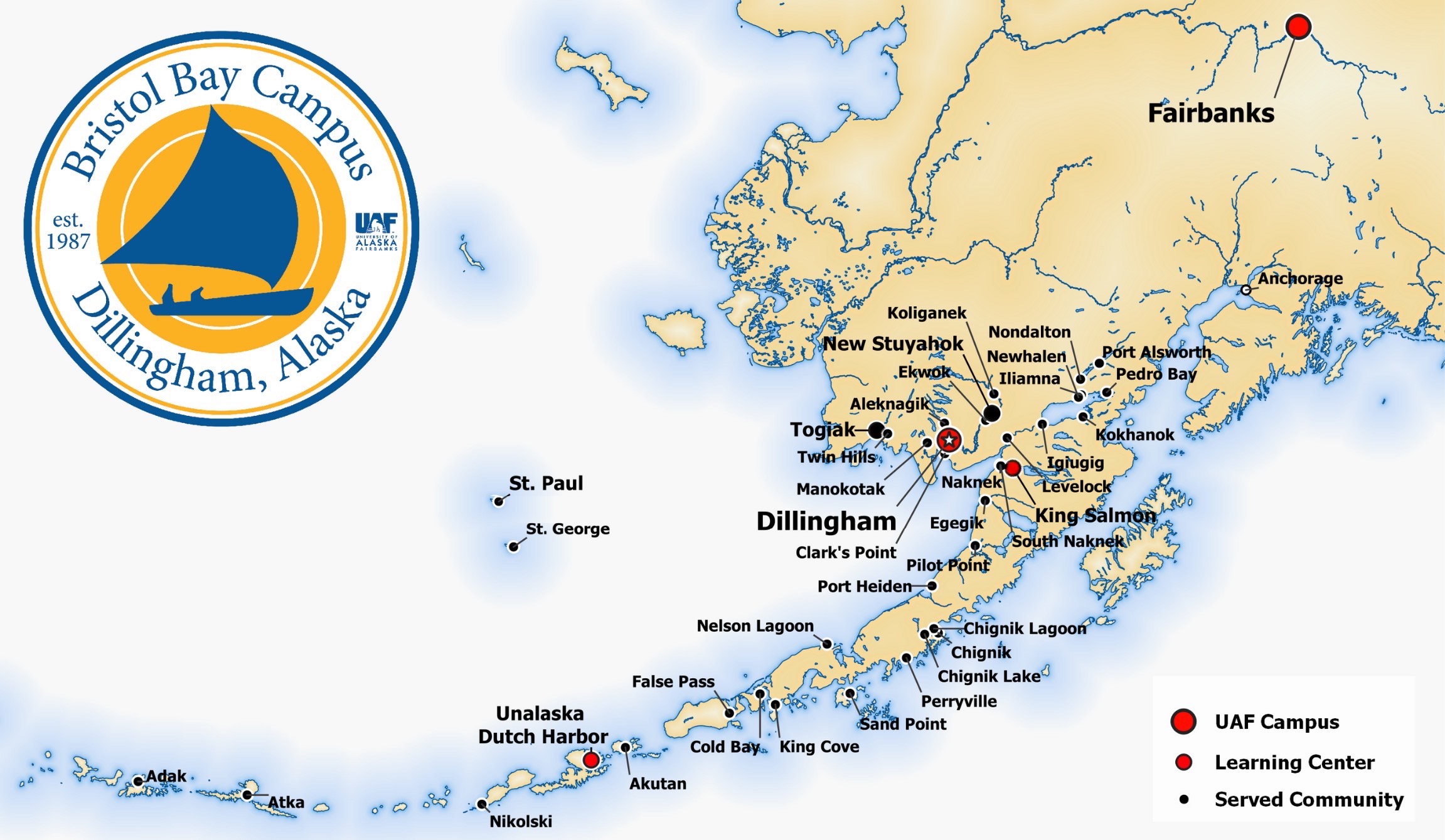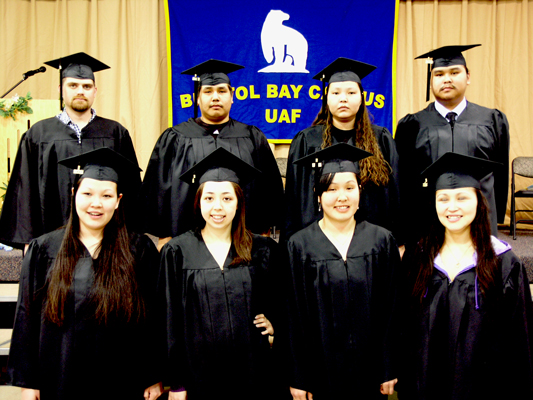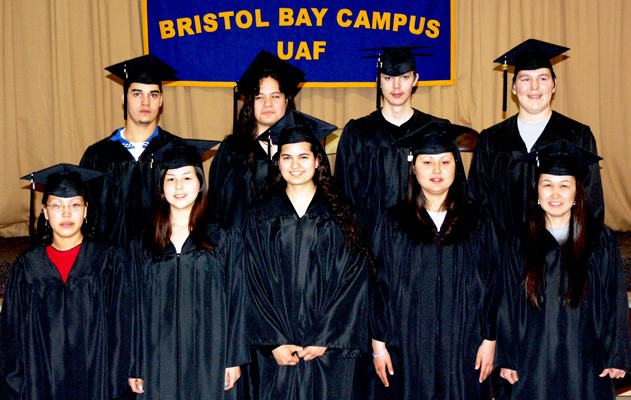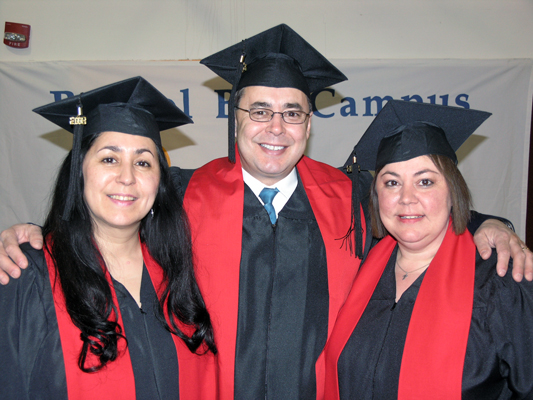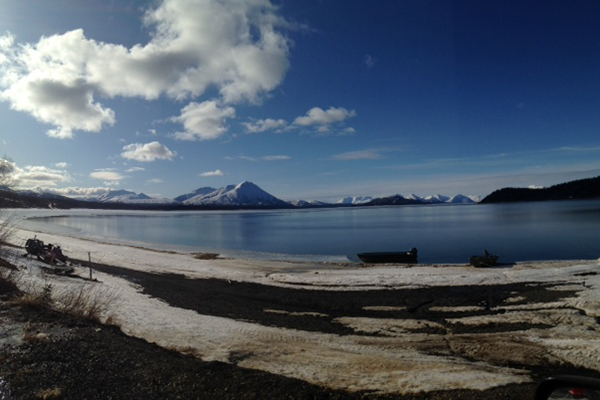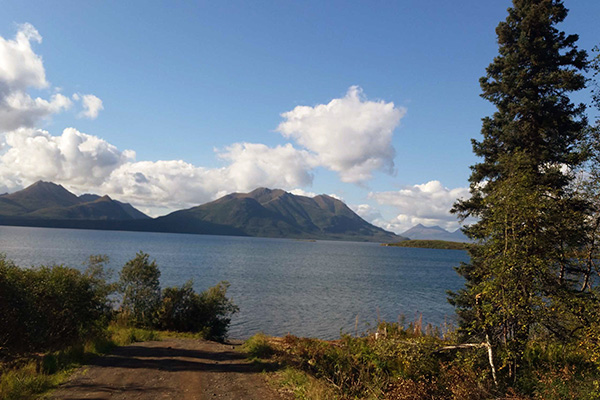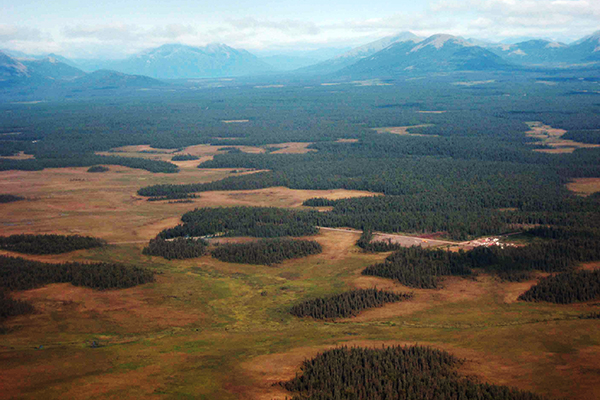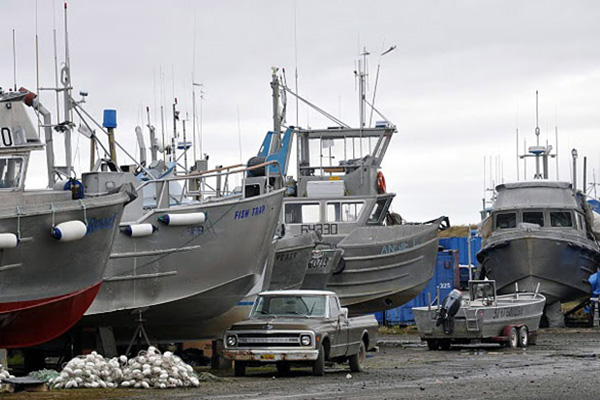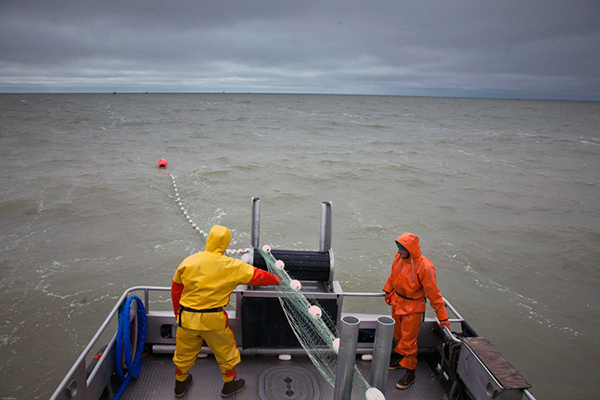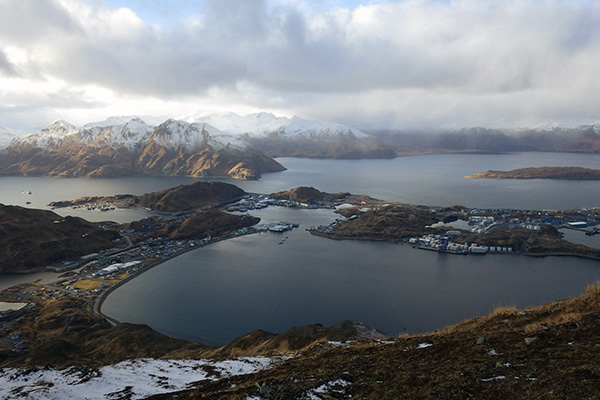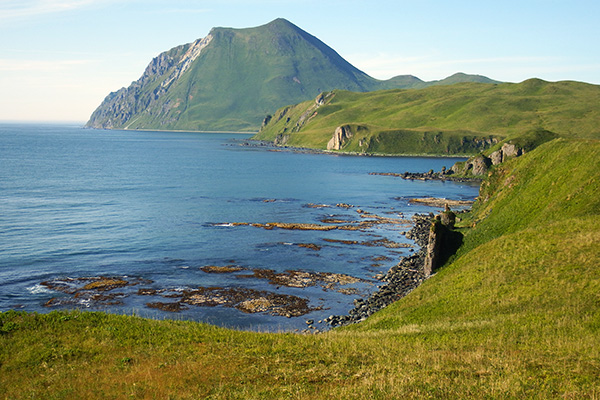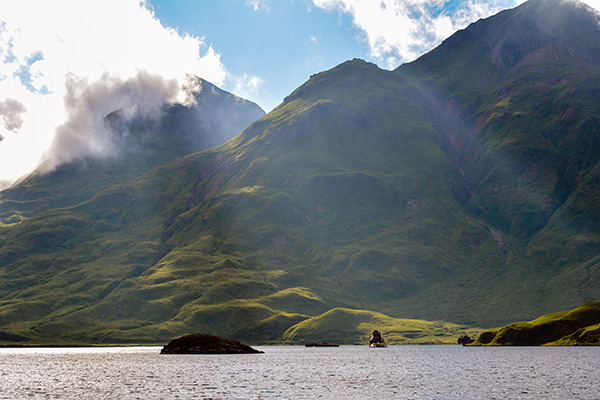Overview
Map of the area Bristol Bay Campus serves
Mission:
The University of Alaska Fairbanks Bristol Bay Campus (College of Indigenous Studies) is committed to knowledge-based education of rural Alaskans. We affect social and economic change of the communities we serve by enriching the quality of life for our students through learning.
Visionary Endeavors:
- Incorporate time-honored convention into curriculum
- Consistently offer quality academic courses, certificates, and degrees
- Deliver relevant location-based fields of study
- Provide unwavering direction, guidance, and support
BBC Values:
- Preparing through education
- Discovering potential
- Connecting and collaborating with Partners
- Respecting culture and tradition
- Commitment to lifelong learning
- Individual empowerment and dedication
BBC Strategic Plan:
Community Campus Profile
 The Bristol Bay Campus is located in the heart of town, nestled between the City of Dillingham Public Library/Museum
and Dillingham High School. This college campus consists of two buildings, the Main
Campus building, and the Applied Science Center.
The Bristol Bay Campus is located in the heart of town, nestled between the City of Dillingham Public Library/Museum
and Dillingham High School. This college campus consists of two buildings, the Main
Campus building, and the Applied Science Center.
Main Campus Building
The Main Campus Building originated in 1981 as a 4,600 square foot (sf) facility and sits on about one acre of land in a mixed commercial and residential area. There were three classrooms, a computer lab, and eight offices. This facility was overcrowded, and the campus made multi-functional use of the limited space.
In 1987 BBC became part of the UAF CIS, with outreach centers located in Togiak, New Stuyahok, and King Salmon, Alaska. The first BBC UAF graduates in 1988 were four students who received Associate of Arts degrees. BBC has used the City of Dillingham Public Library/Museum because the campus has no regional library.
In June 2003 construction began on a new 6,000-sf addition, and simultaneous remodel of the Main Campus building. The total project cost was estimated at $3.5 million, and work was split into two phases with construction completed in 2006.
Phase 1 ($2.5 million) included the building of a new 1,200-sf vocational lab/alternative energy center, classroom and conference room; chemistry lab; a major remodel of the existing facility into classrooms and computer labs; and construction of a 4,800-sf south addition “unfinished shell”.
With the addition of the vocational lab, the welding program increased its capabilities and offered courses such as shielded metal arc welding, gas metal arc welding, and gas tungsten arc welding. Phase 1, totaling $2.5 M (74%) of the total project price tag, was funded primarily by the State of Alaska FY02 Capital Appropriation of $1,425,000. Also, UAF committed to contributing $425,000. In 2002, the people of the State of Alaska voted for $704,000 more for the project in the General Obligation Bond.
Phase 2 was needed to convert an overcrowded and multi-function space into an efficient multi-use space and essential community facility. It was funded by U.S. Economic Development Administration (EDA) grant, Title III Renovation funds and funds from the state.
Phase 2 converted the unfinished shell into administrative offices, faculty offices, student common areas, and a reception area showcasing student and faculty accomplishments along with artifacts, arts, and crafts from local villages. It also housed an admissions/registration suite, student services, financial aid, audio-conference rooms, and a student lounge. Phase 2 construction began in May 2006 for the gradual renovation and addition project, with substantial completion occurring in September 2006.
In 2007 the BBESL was established and was located within the Main Campus building. This certificate program allows students to develop awareness of rural environmental issues surrounding resource development and to participate in field research and data collection. A significant portion of this program is spent out in the field gathering data.
Applied Science Center
In 2011 BBC purchased the NAPA Auto Parts building, which became the Applied Science Center. Renovations began in the spring of 2013. This facility houses the Environmental Science and the Allied Health/Nursing programs.
The Bristol Bay region is located in southwest Alaska. Bristol Bay regional boundaries under the Alaska Native Claims Settlement Act (ANSCA) extend about 350 miles north to south and about 230 miles east to west. The largest land owners in the Bristol Bay region are the state and federal governments. Most of the federal lands are managed as national parks, preserves, and wildlife refuges.
Dillingham is a fishing community situated on Alaska’s southwest coast with a population of about 2,400, closer to 5,000 when the surrounding villages in the official census area are included. It is about 320 miles west of Anchorage. The Dillingham area is characterized by a transitional climate, with an average high temperature of about 62 degrees Fahrenheit in July and an average low temperature of about 8 degrees Fahrenheit in February. Annual precipitation is about 25 inches, with an annual total snowfall of about 71 inches.
Except for roads between Dillingham and Aleknagik, King Salmon and Naknek, and Iliamna and Newhalen, there are no interconnecting regional roads. Most travel between communities is by air.
The Aleutian-Pribilof region consists of the Aleutian and Pribilof Islands. The Aleutian Islands are a chain of approximately 300 islands that extend from the Kamchatka Peninsula to the Alaska Peninsula, a distance of 1,250 miles, separating the Bering Sea from the Pacific Ocean. The Pribilof Islands lie in the middle of the Bering Sea about 200 miles north of Unalaska Island. Harsh climatic conditions, abundant marine life, and some of the largest fisheries in the United States characterize these sparsely populated volcanic islands.
An oceanic climate brings moderate and relatively uniform temperatures and heavy rainfalls. Fog is a common occurrence during the summer months, and the winter weather is subject to the Aleutian Low, a semi-permanent low-pressure system that is one of the primary atmospheric circulation centers of the Northern Hemisphere. The Aleutian Low is also characterized by frequent storms and intense cyclones, bringing gusts up to 150 mph in the winter months. The average temperatures for Unalaska Island, the most populated island, is 30 F in the winter and 52 F in the summer. It rains for an average of 250 days per year with an annual rainfall of about 80 inches.
There are 12 communities within this region: Sand Point, Nelson Lagoon, King Cove, Cold Bay, False Pass, Akutan, Unalaska/Dutch Harbor, Nikolski, Atka, Adak, St Paul, and St George. The 2014 U.S. census has a population of this region near 10,000 people.
The local economy is driven by commercial fishing and seafood processing, which occurs almost year-round. According to the 2014 NOAA Fisheries’ annual report, Dutch Harbor lead the nation with the highest amount of seafood landed for the 18th consecutive year, bringing in 761.8 million pounds at a value of $191.4 million. The remaining ports in the region combine for 640 million pounds of seafood landed at a value of $194 million. While fisheries provide a significant source of income for this area, abundant marine life, and terrestrial flora and fauna support active subsistence lifestyles of many individuals. During the summer months, locals harvest salmon, halibut, greenling, rockfish, reindeer, harbor seals, fur seals, and other marine life, plus, a variety of local plants are harvested for many traditional uses. In the fall, an influx of migratory sea ducks and local ptarmigan are harvested, as well as salmonberries, blueberries, crowberries, cranberries, and bolete mushrooms.
For more information, review the Bristol Bay Region Regional Reference Guide.
UAF's Annual Security Report
The UAF Annual Security and Fire Safety Report is available online. The report contains policies and procedures related to campus safety and security (including response to reports of domestic violence, dating violence, sexual assault, and stalking), statistics for reports of specific criminal activity, and statistics for fire incidents in student housing facilities.
A paper copy of the report is available upon request through the Office of Rights, Compliance and Accountability; 907-474-7300; uaf-orca@alaska.
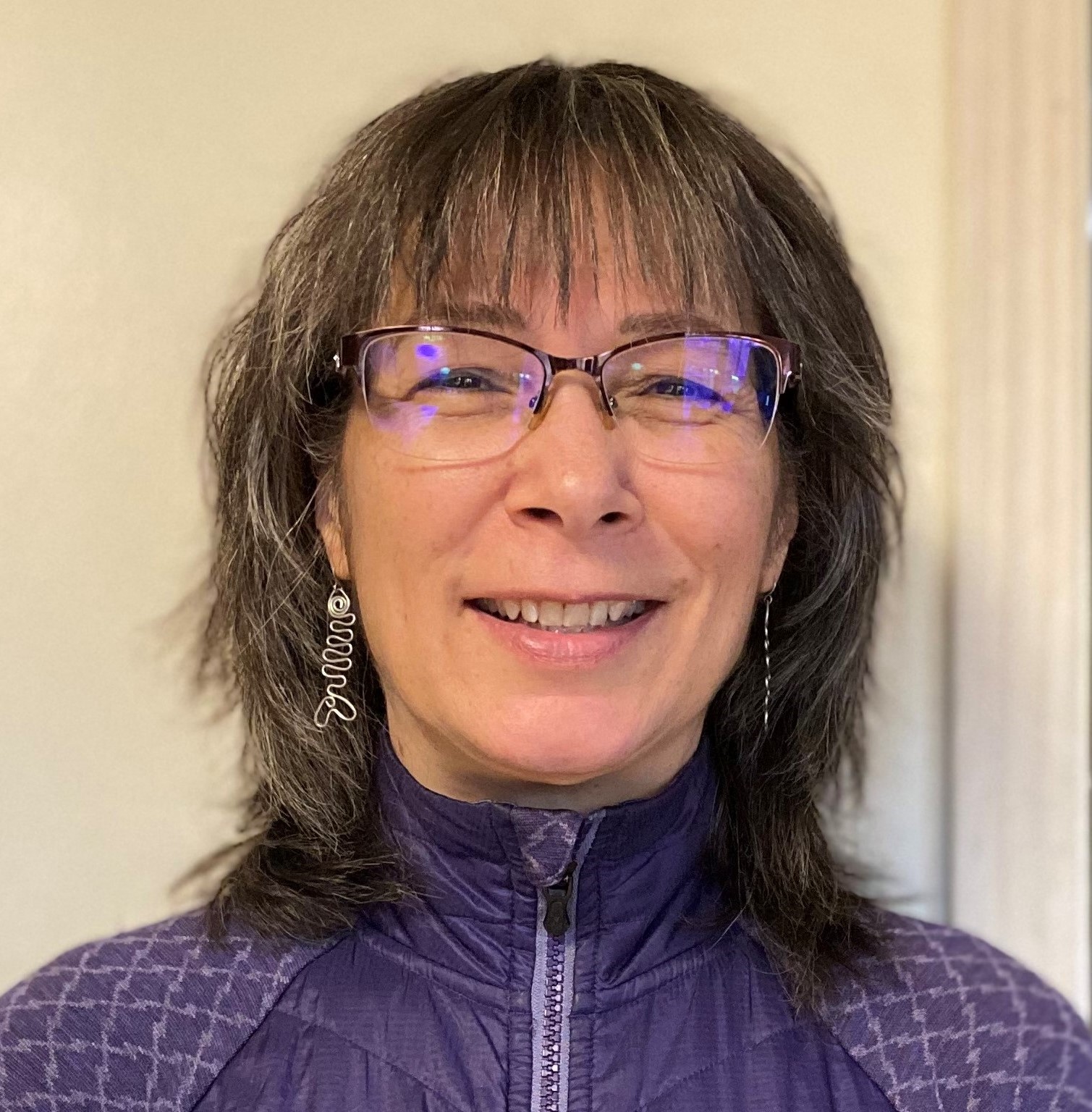
The UAF Bristol Bay campus director:
- Oversees campus operations
- Advocates for the educational needs of communities served
- Supports the development of programs and services offered
- Is fiscally responsible for campus operation fund spending
- Believes the dedicated people who give their time and energy working at the University are making a difference because they genuinely care about the people we serve
Advisory Council
The Bristol Bay Campus Council shall serve as a link between the College of Indigenous Studies (CIS) and the Bristol Bay and Aleutian-Pribilof region residents. It shall be composed of no more than 15 public members, who are residents of the Bristol Bay or Aleutian-Pribilof regions. The Council provides guidance and advice to the director of the campus regarding the higher educational needs of the Bristol Bay and Aleutian-Pribilof regions and the effectiveness of the programs established to meet those needs.
Title IX is a section of the federal law under the Higher Education Act that prohibits sex discrimination in educational institutions. Many people have known it as a law requiring equal male-female representation in sports teams at U.S. colleges and universities, but it actually demands equal access in all programs receiving federal assistance.
The law states that "no person in the United States shall, on the basis of sex, be excluded from participation in, be denied the benefits of, or be subjected to discrimination under any education program or activity receiving federal financial assistance." Therefore, Title IX forbids sex discrimination, including sexual harassment and violence, in all university student services and academic programs.
To learn more visit, the UAF Title IX website.
Our Title IX representative at Bristol Bay Campus is Sandra Long, sclong@alaska.edu, 907-842-5109. If you are staff, faculty or student at Bristol Bay Campus and you seek support or wish to begin an investigation please contact Sandra.
Employees share what they like about the Bristol Bay Campus!
The University of Alaska does not discriminate on the basis of race, color, creed, national origin, religion, age, sex, sexual orientation, gender identity, veteran status, physical or mental disability, marital status, changes in marital status, pregnancy or parenthood, genetic code or retaliation. This policy affects employment policies and actions, as well as the delivery of educational services at all levels and facilities of the University. For a full explanation of what laws apply and contact information on how to file a report visit the Nondiscrimination site.
The UAF-Bristol Bay Campuses' mission is to provide educational opportunities by which rural Alaskans can effect social and economic changes in their communities and thus protect and enrich the quality of their lives and culture.
Your generosity will help to ensure that the continuity and vibrancy or our rural communities and our ability to serve our state, nation, and the world—for generations to come.
Resources:
For more information on giving to the UAF Bristol Bay Campus, please contact:
UAF Development and Alumni Relations
Phone: 907-474-2619
Email: uaf-giving@alaska.edu
Or, contact our campus directly 907-842-5109.
The UAF Bristol Bay Campus is in affiliation with the Drumbeats Alaska Consortium.
- Alaska Department of Fish and Game
- Alaska Department of Labor
- Alaska Sea Grant Program
- Bristol Bay Area Health Corporation
- Bristol Bay Borough
- Bristol Bay Borough School District
- Bristol Bay Economic Development Corporation
- Bristol Bay Native Association
- Dillingham City School District
- Icicle Seafoods
- Lake & Peninsula Borough
- Lake & Peninsula School District
- Nushagak Cooperative
- Southwest Alaska Vocational and Education Center (SAVEC)
- Southwest Region School District
- U.S. Department of Agriculture
- U.S. Department of Education Title III and Alaska Native Education Program
- U.S. Department of Housing and Urban Development
- U.S. Economic Development Administration
- U.S. Fish and Wildlife
- University of Alaska Anchorage Nursing
Quick links to our community
Room Rental Information
UAF Bristol Bay Campus has classroom space, laboratories, and conference rooms available for rent. Space must be reserved in advance. Priority is based on alignment with the Campus' mission. Additional charges may apply.
Meeting Room Usage Policy
- Rooms are equipped with moveable tables and chairs.
- Please allow adequate time to set up for your group needs.
- When meetings are over, it is the group's responsibility to clean up and remove boxes and excessive trash from the room. If the room is left messy and dirty, a cleaning fee of $125 may be billed.
- All audio-visual equipment other than what is rented with the room must be provided by the user. Equipment may not be stored in the room.
- Users are not permitted to tape or fasten visuals or other items to walls.
- Alcoholic beverages are not permitted.
- A group must supply own coffee/coffee supplies.
GED testing and Pearson VUE testing
Please call the Dillingham campus at 907-842-5109 to learn about specific test availability.




